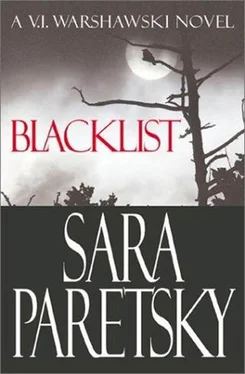Janice and her brother glared at me, but Daddy’s wishes took precedence over their bruised egos, or rib cages, as the case might be. Janice’s plucked brows met briefly over her nose, but she kept from wrinkling her forehead. It pays to work for a woman’s magazine-you learn good tips on how to preserve your face. She put her cell phone into the side compartment of her briefcase and told me to follow her. Her brother stayed in step next to me.
When we got to the executive suite, the other brother took me into his father’s office. Augustus Llewellyn was sitting behind his desk, a leatherinlaid partners’ specimen that might have been a couple of hundred years old. There were a number of interesting antiques in the room besides the desk, but the one that caught my eye was an old hand press standing on an octagonal table.
I walked over to look at it. “Good evening, sir. Is that what you used to print T-Square on?”
Llewellyn ignored me, turning to his children and telling them they could leave. When the son I’d elbowed protested that I might be violent, his father managed a small smile. “If she harms me, you’ll know exactly who did it, and you can have her arrested. But for now I want to be alone with her. And that means you, too, Marjorie.”
The last remark was addressed to the older woman, who I assumed was the secretary I’d spoken to the day before. When all four had left, I pulled up one of the two contemporary chairs in the room and faced Llewellyn across his desk. He folded his hands in his lap but didn’t speak.
“I’m the detective whom the Whitby family-“
He cut me off. “I know that you and your underlings have been questioning my staff recently, young woman. Not much happens in this company that I don’t know about.”
“Then you know that Marcus Whitby wanted to see you shortly before he died. Did he talk to you about his meeting with Olin Taverner?”
“If he did, that would be of no concern to you.”
“You agreed to see me, Mr. Llewellyn,” I said gently. “I think if you knew what Taverner had told Whitby you wouldn’t need to talk to me. So I’m assuming you didn’t see Marc Whitby before he died.”
He nodded slightly, but didn’t offer any comment.
“Olin Taverner held on to a secret, or maybe a series of secrets, about people in New Solway, and people involved in ComThought-the Committee for Social-“
“Yes, I know what ComThought is, or was.” He cut me off again. “And I know Taverner was obsessed with it as a Communist front. I don’t think they were ever the threat to America’s safety that Olin claimed, but I had my fill, of the left at Flora’s all those years ago. They were a ramshackle lot who turned on each other like rats in a proverbial barrel. They had no real interest in the working man or woman, only in their stupid revolutionary rhetoric. America rewards self-determination. They could never see that.”
“Pelletier says you sat in on the committee’s beginnings at Flora’s.” I spoke flatly, as if what I were saying were undisputed truth, not my own unverifiable guesses “You say this is an unpublished manuscript.” Llewellyn tapped my note with his index finger. “How did you come to read it?”
“The same way Marc Whitby did-by going through Pelletier’s papers at the University of Chicago. It sounds as though Flora’s was an exciting place-meatpackers and novelists rubbing shoulders with dancers and journalists, a miniature Greenwich Village on the near West Side. Calvin Bayard dropped in from time to time, so you got to know him. And ultimately he guaranteed the loans that allowed you to abandon that hand press over there and move to real machines. What did you have to do in return, Mr. Llewellyn?”
“I fail to see how that concerns you, young woman.”
“Did he ask you to make a contribution to ComThought’s legal defense fund? And if so, why should that be a secret?”
“Again, this is no concern of yours. You come in here with tales of Armand Pelletier and Miss Ballantine, but you were hired, I believe, to find Marcus Whitby’s killer, and, if I’m not mistaken, Mr. Whitby died last week, not in 1957.”
I smiled evilly. “He died because of what he’d learned about 1957, about the relations among you and Calvin Bayard and Armand Pelletier. I’m tracking those down.”
His pressed his lips together in a tight angry line, but said, “Armand Pelletier made Calvin’s fortune. Not that book alone, that famous Tale of Two Countries, but he got Calvin the entree to the kind of authors Bayard Publishing needed if Calvin was going to turn a stodgy family firm into a success. If Pelletier was enthusiastic about something, Calvin was bound to be there, too. I never knew if Calvin was protecting his investment in Pelletier, or if he really was the eager puppy dog he acted around Pelletier. After all, Armand had been shot in Spain-that counted for a lot in the crowd they hung out with. I was a young and earnest journalist, Pelletier thought he could patronize me, Calvin tagged along. I paid back those loans. If you’ve dug enough dirt to find that Calvin secured them, you know that I repaid them.”
“Yes, sir. But Mr. Bayard exacted a quid pro quo, which startled even some of the starchy old ladies in New Solway, who didn’t share his enthusiasm for your enterprise.”
“And if he did, you think I should tell you?” His voice was level, but a pulse throbbed in his temple.
“I’ll find it out,” I said. “Geraldine Graham-do you remember her from those days at Flora’s?-may make up her mind to speak. Or I’ll find out from Renee Bayard. Or-someone else. People like to talk, and when they get old, they get to be like Olin Taverner-they don’t want their secrets to die with them.”
A corner of his mouth lifted into a sneer. “Oh, I remember Geraldine Graham. She was like so many rich white girls of the forties. And the fifties. And the current age. Hot bored things who look for the secret thrill the black man can provide. In her case, it was the Red man, the Communist man, but the spice of feeling the sweat of black workers gave it an added zest for her. If she decides to talk to you about those days -I will be very surprised.”
“Every generation likes to think it was the first to discover sex; Ms. Graham might enjoy reminding the rest of us that.she got there ahead of us. If Pelletier can be believed, she was sleeping first with him, then with Calvin Bayard; meanwhile, you brought Kylie Ballantine to Flora’s bar, where she met Pelletier and Bayard and all those other people.” I was embroidering recklessly, both on Pelletier’s manuscript and on the hints I’d picked up from Geraldine Graham. “So when they decided to hold a fund-raiser for ComThought’s legal defense fund, you all went up to Eagle River together.”
He said coldly, “It’s not unusual for a journalist to write up a political fund-raiser, especially when it’s an unusual political group.”
“Pelletier wrote that you were a fellow traveler back in the forties. I’m sure that interested Bushnell’s committee no end.”
“Pelletier wrote a lot of crap in his later years. He was a drunk and bitter man. I didn’t worry about it then and I won’t lose sleep over it now.” “You wouldn’t mind if the Republican National Committee found out you’d been Communist, or at least a Communist sympathizer?”
He gave a derisive snort. “My fellow Republicans include many repentant former leftists. As a black man, I already command unusual attention in the party. If I confessed to Communism, it would only add to my luster.”
“So it didn’t bother you that Marc Whitby learned you’d been at the ComThought fund-raiser. Would you mind the world knowing it was you who sent Olin Taverner a photograph from that same event that cost Kylie Ballantine her job?”
Читать дальше












